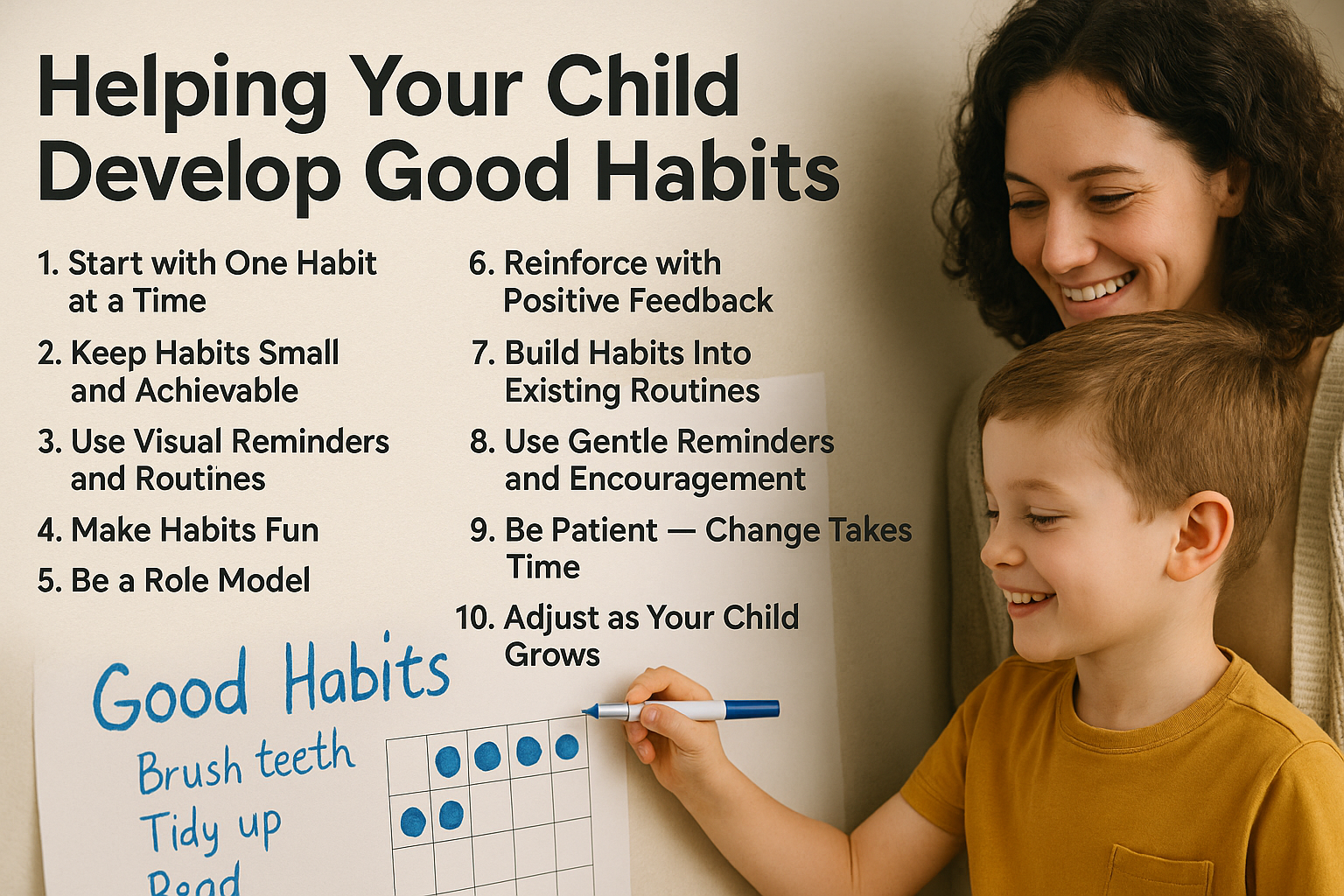Habits shape our lives — and the earlier we build positive ones, the easier they are to maintain. For children, developing good habits creates a foundation for responsibility, health, and lifelong success. The key is consistency, patience, and a bit of creativity.
Here’s how you can guide your child in building strong habits from a young age.
1. Start with One Habit at a Time
Trying to change everything at once can overwhelm your child and lead to frustration. Focus on one habit first, and stick with it until it becomes a natural part of their routine.
Examples:
- Brushing teeth every morning and night
- Cleaning up toys after play
- Reading 15 minutes a day
Success in one area builds motivation for others.
2. Keep Habits Small and Achievable
Big goals are built on small steps. Break habits down into bite-sized actions your child can accomplish easily.
Instead of “be organized,” start with:
- Putting shoes in the right place
- Hanging up a backpack after school
Small wins lead to big results over time.
3. Use Visual Reminders and Routines
Children thrive with structure. Use charts, checklists, or visual cues to help them remember their daily tasks.
Ideas include:
- Morning routine charts (brush teeth, get dressed, eat breakfast)
- Homework checklists
- Chore wheels or sticker charts
Keep visuals simple, colorful, and accessible.
4. Make Habits Fun
When building a habit feels like a game, kids are more likely to stay engaged.
Try:
- Turning cleanup into a race
- Singing a song while brushing teeth
- Creating a reward system (like earning tokens or stickers)
Fun removes resistance and turns routines into something enjoyable.
5. Be a Role Model
Children imitate what they see. Show your child that habits are part of your life too.
Say things like:
- “I always make my bed in the morning — it helps me start my day right.”
- “I set out my clothes the night before so I’m not rushed.”
Your example is often more powerful than your instructions.
6. Reinforce with Positive Feedback
Praise effort, not just results. When your child sticks to a habit, offer encouragement:
- “I’m proud of how you remembered to do that all on your own!”
- “You’ve been brushing your teeth without reminders — that’s awesome!”
Celebrating progress helps reinforce the behavior.
7. Build Habits Into Existing Routines
It’s easier to form new habits when they’re attached to existing ones — this is called “habit stacking.”
For example:
- After brushing teeth, put dirty clothes in the laundry
- After dinner, feed the pet
- Before bedtime, read one book together
The brain connects the new habit to a familiar action.
8. Use Gentle Reminders and Encouragement
Don’t expect your child to remember everything right away. Gently remind them without turning it into a nagging session.
Use phrases like:
- “What’s the next thing on your chart?”
- “Let’s do it together this time.”
- “Remember our new bedtime habit?”
Kind reminders encourage cooperation.
9. Be Patient — Change Takes Time
Habits aren’t built overnight. Be consistent, even if your child forgets or resists. Repetition is what makes a behavior stick.
Avoid scolding for small slip-ups. Instead, focus on the progress and keep moving forward.
10. Adjust as Your Child Grows
As your child gets older, habits will need to evolve. What worked for a 5-year-old may not work for a 10-year-old.
Revisit routines regularly and ask:
- “What’s working well?”
- “What do you want to do differently?”
- “What new habits do you want to build?”
Involving your child in the process empowers them to take ownership.
Final Thought: Good Habits Are Lifelong Gifts
Helping your child build good habits is one of the most valuable investments you can make in their future. These everyday routines shape their sense of responsibility, self-discipline, and self-esteem.
With patience, consistency, and support, you’re not just creating order — you’re building character.
